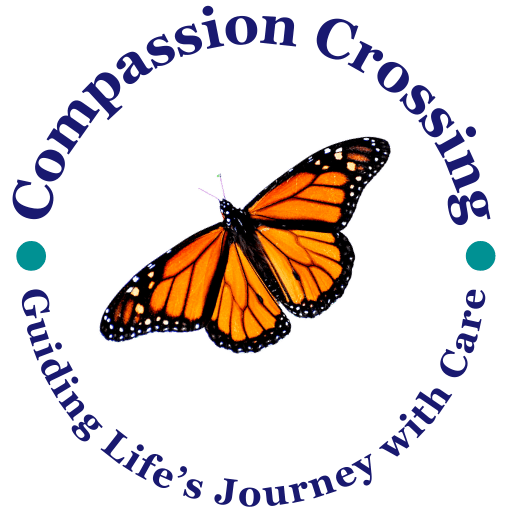Welcome to Compassion Crossing! We’re here to help you navigate life’s important health decisions—whether you’re planning ahead while you’re healthy or facing illness right now.
This website supports anyone who wants to feel more prepared and confident about their healthcare journey. You’ll find practical articles on advance care planning, medication safety, care coordination, pain management, palliative care, grief support, and making difficult decisions. Whether you’re creating your advance directives, caring for someone with a chronic or terminal illness, or working as a healthcare professional, these resources are designed to help you feel less overwhelmed and more in control.
When you hire us, we become your personal healthcare project manager. Our team coordinates care among your doctors, reviews medications to identify dangerous interactions, and ensures every step of your treatment is carried out correctly. For clients in Madison County, Kentucky and the closest neighboring areas, we attend appointments and hospital procedures with you in person. All other services work remotely, no matter where you live. This careful oversight improves your quality of life. It may extend life by preventing medication errors, catching problems early, and ensuring treatments work as intended.
You don’t have to navigate this alone. Whether you’re healthy and planning for the future, managing complex health conditions, or need information and personal support right now, we’re here to coordinate your care and support you every step of the way.
How We Can Help
We provide support tailored to your needs during life’s most challenging transitions. Whether you’re seeking helpful articles, personal guidance with active care coordination, or professional training for healthcare teams, we’re here to walk alongside you every step of the way.
Educational Resources
500+ articles provide comprehensive guidance on caring for loved ones with chronic or terminal illness, coordinating complex healthcare, managing medications safely, coping with grief, and end-of-life care. These resources help you understand what to expect and how to provide the best care possible.
Personal Support
We offer personalized services for individuals and families. As your healthcare journey project manager, we coordinate all aspects of your care between multiple providers, attend medical appointments and hospital procedures with you, review medications from all sources to prevent dangerous interactions, and ensure nothing falls through the cracks.
Our services include:
- Advance Care Planning — prepare for future decisions.
- Dementia Care Coaching — support for memory-related changes and caregiving.
- Grief Support — helps you through loss and healing.
- Illness Navigation — guides you through new diagnoses.
- Medication Reviews — prevent errors and improve safety.
- Staff Training & Development — equips healthcare teams with skills to provide compassionate, effective care.
- Wellness Checks — peace of mind and health monitoring.
On-site visits are available throughout Madison County, Kentucky. Virtual meetings are available anywhere through Google Meet, Zoom, or phone for education, planning, and ongoing support.
Finding What You Need
Use our menu to explore:
- Blog – New articles plus important pinned posts at the top covering care coordination, medication safety, symptom management, and compassionate care.
- Featured – Key areas for palliative or hospice care include medication management and care coordination.
- Categories and Tags – Find articles by topic, including medication safety, care coordination, and illness navigation.
- Popular Articles – What others find most helpful for managing complex healthcare journeys.
- Resources and Recommended Reading – Additional support materials for coordinating care and safely managing medications.
About Our Author
Peter Abraham, BSN, RN, writes articles, books, and guides that help hospice nurses, end-of-life doulas, holistic nurses, and caregivers feel more confident in their essential work. With years of hospice and palliative care nursing experience, Peter understands the critical importance of coordinating care, preventing medication errors, and serving as a healthcare journey project manager for patients with complex medical needs.
He also shares his knowledge through his growing YouTube channel, Nurse Peter, where he discusses death, dying, compassionate care, medication safety, and care coordination with hospice nurses, holistic nurses, caregivers, family members, and end-of-life professionals. His goal is simple: reduce stress, prevent complications, and create a more supportive environment for everyone involved in caring for others.
Ready to Talk?
We’re here to help you during this difficult time. Schedule a free conversation to see how we can serve as your healthcare journey project manager, coordinate your care, and support you, someone you care about, or your organization.
This site uses affiliate links that don’t change your price but help us keep all content free and ad-free. We believe everyone deserves compassionate support and proper care coordination during life’s most challenging moments.
This site is hosted by Dynamic Net, Inc., which the author highly recommends for hosting services.
